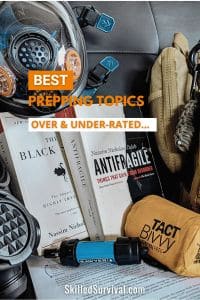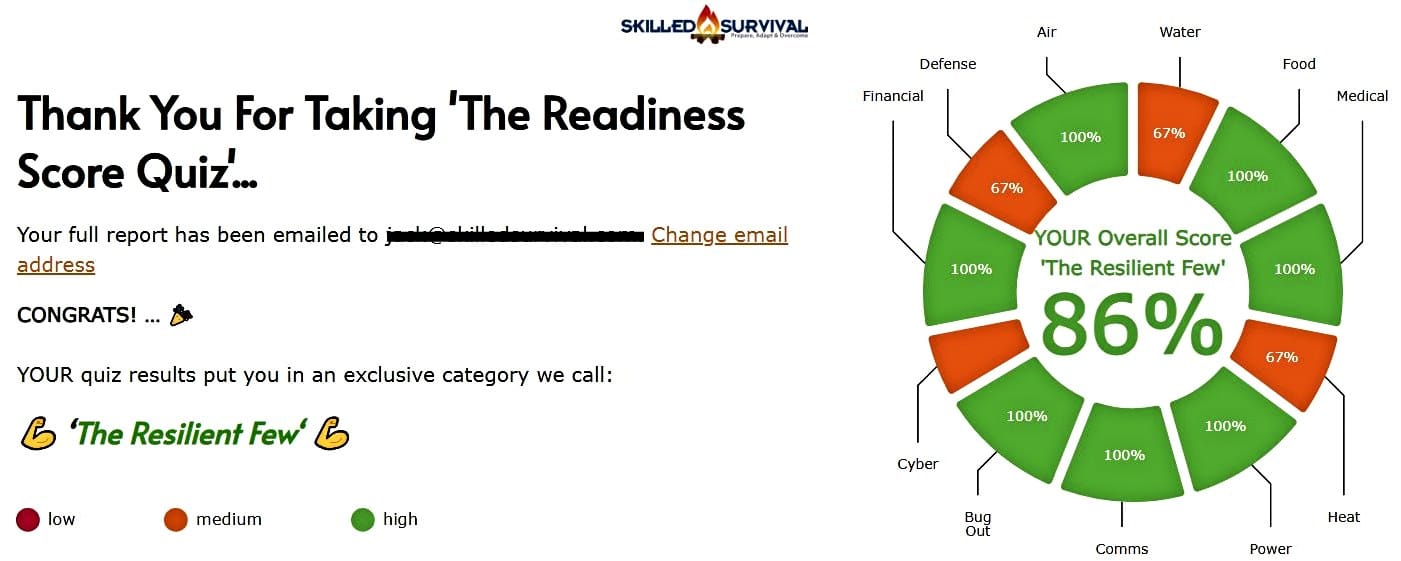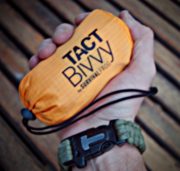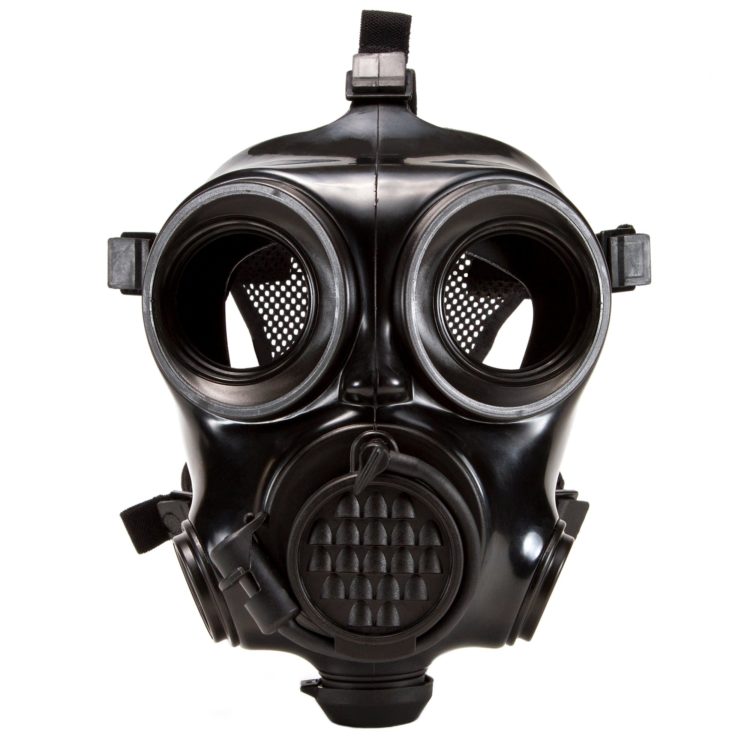
An Epic List Of All The Under-Rated & Overlooked Prepping Topics
- Because your probably spending way too much time on some topics
- And not nearly enough time on others…
And THAT’s not good…
Time and energy are limited resources!
So using them wisely is critical to making REAL prepping progress…
TOPICS IN THIS LIST… ↓(click to jump)
- 1. Wasting Time On Predictions
- 2. Wilderness Survival Skills
- 3. Buying Latest Survival Gadgets
- 4. Fear-Based Survival Products
- 5. Too Much “News” Consumption
- 6. Not Measuring Your Resiliency
- 7. Ignoring The Prepping Basics
- 8. Honing Your S.A. Skills
- 9. Lots Of Water Filtration
- 10. Not Having A “Plan B”
- 11. Ignoring A Gas Mask & Filters
- 12. Overlooking Physical Fitness
- 13. Ignoring Local Emergencies
- 14. Not Practicing Your Plans
NOTE: You can either continue to read this article OR watch the following video (both cover the same content):
↓ 14 Overhyped & Under-Appreciated Prepping Topics
Let’s jump right into the first “Over-Hyped” prepper topic:
1. Wasting Time Trying to Predict The Next Disaster
This is one of the biggest wastes of time out there.
As humans, we have a terrible track record of predicting anything.
Sure, we can predict some minor things, like tomorrow’s weather or your dinner plans.
But not bigger, broader “societal level” predictions.
I’m talking about significant events related to financial markets or future disasters.
And the more specific the predictions, the bigger the waste of time they tend to be.
For example:
Here’s an excerpt from Howard Mark’s recent investing memo “Thinking About Macro”:
“In December of 2019, the median forecast on Wall Street held that the S&P500 would rise 2.7% in 2020. What was the actual return? 18.4%! It was too low by 16 percentage points. Worst yet, in April 2020, after the Pandemic had taken hold (and after the congress and the fed had taken action), the consensus forecast return was revised downward to a negative 11%. That’s nearly 30 percentage points below the eventual outcome.”
These “professional” forecasters are pretty much worthless.
We can’t predict the future when it comes to markets and disasters.
So, instead of predicting the next disaster, focus on being more resilient.
Spend time becoming less fragile to ALL future disasters!
You don’t need to predict a future disaster – assume there will be turmoil.
And then focus on taking action to be ready for it.
OK, here’s a quote from one of my favorite books on understanding risks in our lives, Antifragile:
“You can’t predict in general, but you can predict that those who rely on predictions are taking more risks, will have some trouble, perhaps even go bust. Why? Someone who predicts will be fragile to prediction errors….”
I think this is saying that those who spend time predicting and “believing” they can figure out BEFORE EVERYONE ELSE are fooling themselves.
They’re fragile because they assume their prediction powers will help them see the future.
Giving them time to “move out of the way” before disaster strikes.
But they rely on their “false sense of prediction accuracy” to protect themselves.
Instead, they should invest their time and energy in becoming resilient to ANY future mishaps.
One more quote from the book “The Black Swan” (by the same author) sums it all up by simply saying:
“Invest in preparedness, not in prediction.”
2. Mastering Wilderness Survival Skills
OK, before you get upset with me, let me say there is SOME value in learning Survival Skills.
It’s just not as much as you think.
Let me ask you a few questions:
What are the odds of spending a night in a debris shelter?
Extremely low. You’d need to be stranded in the woods without a vehicle or backpack.
And be more than a day’s hike from any town or village.
It’s just not likely to happen.
Or what about starting a fire with sticks?
Nearly zero if you always keep an electric lighter or Ferro rod with you.
How about making your own bow and arrows from scratch?
Perhaps this skill comes in handy in a worst-case mass human extinction situation.
But if that happens, you’ll find both by scavenging sporting stores or abandoned homes.
Now compare those bushcraft skills that you’ll likely never use to the following:
What are the odds of having to live without electricity for a week?
This happens to millions of people throughout the world ALL THE TIME.
What about a deadly pandemic where you don’t want to go into a grocery store without a gas mask?
Seems much more possible nowadays.
Or how about a wildfire tearing through your neighborhood?
Again, it happens every year, and it’s getting worse; that’s why you should have a bug-out plan…
So, unless you become unlucky and end up stranded on an island, most bushcraft skills are just a fun hobby AT BEST.
They’re mostly just for entertainment purposes (like the video below):
↓ Primitive Technology: Wattle And Daub Hut
So, instead, focus more on your limited time, energy, and resources where you’ll get the most bang for your buck.
Abilities that will significantly improve your overall resiliency to the most likely emergencies.
3. Buying All the Latest Survival Gadgets
I enjoy checking out all the latest survival gear and gadgets on the market.
It’s cool to analyze them and even test them out occasionally.
The latest tactical watches are chalked full of technology, but they have a high price tag to match.
But again, these fancy new gadgets are NOT likely to be the gear you need in most emergencies.
Most essential survival gear has already been invented.
And while this “old school gear” seems dull, they’re proven and work.
For example:
- Freeze-dried foods, mylar bags, and oxygen absorbers (or desiccants)
- Water containers and rainwater collection systems
- Water filtration devices
- Rocket stoves
- Tact Bivvy’s
- Bug Out Bags
- Respirator Masks
- Etc.
These are “older” but proven technologies that are much more important than the coolest survival gadgets you see coming on the market today.
Thus, making most of the latest survival gadgets an overhyped prepping topic.
4. Paying Attention To Overly Fear-Based Survival Products
I hate hyper-fear-based marketing.
Perhaps you know what I’m talking about. It’s those 30-minute video sales pitches that tell a doomsday story.
Often these stories are about a 3rd world country OR the coming apocalypse.
Ancient biblical predictions are being proven today, and the end times are here.
The reason marketers do it is because IT WORKS.
But it’s not accurate.
It’s a fear-based story to get you to buy their product to reduce the discomfort they created.
In my opinion, it’s not ethical. It’s pure manipulation.
It works because it preys on humans’ attention filters.
We don’t have the mental capacity to consume even a fraction of all the available information.
So we use a simple filter to ignore the mundane, boring stuff.
And only allow the most dramatic and exciting stuff to get through.
That’s why most media stories are negative.
They focus on storms, shootings, diseases, floods, building collapses, plane crashes, etc.
The more dramatic the news, the more we listen and pay attention to it.
It’s hardwired into our brains for evolutionary reasons.
Because those who paid attention to a wild animal attack survived, and those who didn’t survive.
And the media and marketers know fear is the easiest way to grab and keep your attention—fear in the name of profits.
Instead, I use reason and logic to talk to you with respect.
I want to see EVERYONE work towards becoming more resilient over time.
Sure, some urgency is called for; you never know when the next big collapse or disaster will be.
And a bit of urgency can help create a healthy amount of motivation.
But you should ensure that the product being pitched has real value first.
They should be willing to EARN YOUR TRUST before you buy.
If everything you hear is the end of the world, scary and fear-based, AND their $37.95 product is the ONLY solution to this problem.
And everyone who doesn’t buy it will perish tomorrow.
Then shut it off immediately and look for a product that has more respect for you.
5. Continuous “News” Cycle Consumption
This prepping topic is somewhat related to the previous one.
What is objective truth nowadays?
Who the hell knows?
Seriously, it seems like TRUTH is a myth of yesteryears.
Or maybe the past truth was only an illusion held firm by a select number of media outlets…
But it’s seemingly harder to get to the heart of any issue without a political spin or a hidden agenda tied to it.
And the news media makes money off YOU PAYING ATTENTION.
They put those flashing red scrolling emergency banners at the top and bottom of your screens because they help increase your watch time.
↓ Breaking News Flash Banner
The more people watch, the longer they watch, and the more they can charge advertisers during commercial breaks.
Most news outlets (cable, radio, newspapers, etc.) use “controversy” and “fear” to get you hooked.
For example:
When listener numbers on hardcore political talk radio show start to soften, the producers prod the on-air hosts to stir up the pot.
To create some anger to get their listeners hot and bothered.
It’s an outrage machine (see the video below for more details):
↓ Dan Carlin: Fake News, Misinformation, and Being And Informed Citizen
And if you consider yourself to be “tuned in” and “in the know,” you’re probably paying a high price to be “informed.”
You’re paying for this “informed status” at the cost of your internal peace and happiness.
You’re handing over your calm for what?
Restless nights, arguments with family and neighbors, mistrust of anyone with a different political stance…
I think it’s a terrible trade-off.
Because I believe statistics and narratives can be spun in any way the media desires.
So what you hear is what you WANT to hear.
Instead of having a productive discussion about how best to live as a society – nowadays, it’s all about hate, blame assignment, and finger-pointing.
And it’s just not helpful.
Instead, I focus most of my time and energy on things I CAN CONTROL.
And for the most part, the 24-hour news has minimal impact on my life and resiliency.
It’s got an insanely high noise-to-signal ratio.
Most “news” you consume daily is noise.
Very little is essential a few months or even a year later (minimal signal).
It’s mostly just junk (or noise).
The more information you consume daily, the more noise gets in.
And if something is truly a signal, don’t worry; you’ll hear about it in other ways.
Your neighbors will mention it, or your emails will include a reference.
Here’s what the book Antifragile has to say about the “signal to noise” problem:
“Thanks to [constant news cycles], we are living more and more in virtual reality, separated from the real world, a little bit more every day, while realizing it less and less. Consider that every day, 6,200 persons die in the United States, many of preventable causes. But the media only reports the most anecdotal and sensational cases (hurricanes, freak incidents, small plane crashes) giving us a more and more distorted map of real risks. In an ancestral environment, the anecdote, the “interesting” is information; no longer today. Likewise, by presenting us with explanations and theories the media induces an illusion of understanding the world.”
Well said.
OK, let’s move on to the over-appreciated prepping topics to which you should pay more attention, but you probably are not.
6. Measuring How Resilient You Are (OR Not)
I want to start with a couple more prepping quotes from Antifragile (again, it’s one of my favorite books):
“It is far easier to figure out if something is fragile than to predict the occurrence of an event that may harm it.”
“Not seeing a tsunami or an economic event coming is excusable; building something fragile to them is not.”
So stop spending so much you’re your time-consuming news and trying to predict the next disaster.
Instead, reallocate that same time and energy into activities and self-improvement with a REAL IMPACT when a future disaster arrives.
Just assume the future holds several major disasters in your lifetime.
Then do something about it.
Go from being a part of “The Fragile Masses” into “The Resilient Few.”
That’s what my website community, “The Resilient Life,” is all about.
We challenge you to take care of the preparedness basics. And then, once those are covered, we give you the motivation to keep going.
To become as resilient to the unknown future as you’re comfortable with.
Go here if you’re interested in learning more about The Resilient Life
7. Don’t Ignore The Prepping Basics
Prepping basics may seem boring to some:
Two weeks of food, 2 weeks of water, medical supplies, yawn…
But the problem is, those “basics” are the building blocks of becoming resilient.
If only everyone in the world had the prepping basics in place. As a human species, we would be much more resilient to all future tragedies (global or local).
But unfortunately, it’s more fun to focus on more interesting topics.
So, if you’re reading this right now and don’t have your prepping basics in place (or you’re wondering what basics I’m talking about), go here now.
8. Honing Your Situational Awareness
Here’s the deal.
Some folks have good situational awareness, while others don’t.
I don’t know if some folks are just blessed by their DNA and brain makeup, or perhaps it’s the way their parents raised them.
It’s probably some combination of both.
But man, if you don’t have good situational awareness, you’re in real trouble when things get chaotic.
It’s hard to think straight when you’re afraid.
And situational awareness is not just during times of chaos – it’s anytime you’re in new or public spaces.
When I go somewhere new, I take stock of the “situation,” like the place’s layout, before relaxing and enjoying myself.
I want to know where the exits are (in case of a fire OR a mass shooting).
I want to take stock of the folks I’m with and watch for anyone who doesn’t quite belong.
Since I have little kids, when I go to the grocery store, I strategically park where they don’t have to walk behind any cars or cross streets.
Sure, it’s a further distance to walk, but it removes the risk of my kids getting run over on accident.
You should learn to stop and think more about the world around you.
To work on improving your sense of situational awareness.
That way, this prepping topic can reduce many unnecessary risks in your life.
9. Plenty Of Water Filtration
“When the well is dry, we know the worth of water” – Benjamin Franklin
This is so true.
That’s why you should stockpile water today.
But what if you have some water that becomes contaminated or compromised?
If you’re ever forced to drink contaminated water, you’re putting yourself at extreme risk – especially during an emergency.
Severe uncontrollable diarrhea is deadly during an emergency – especially if you can’t get medical assistance.
Water filtration is one of those “boring, forgotten about” topics in preparedness.
It’s one of those “yeah yeah, I get it” topics.
And that’s fine IF you have your water filtration plan.
Suppose you have a LifeStraw, a few sawyer minis, and an AlexaPure Gravity Filter; great.
Just make sure you have plenty of water filtration at your disposal NOW.
If not, then please heed this warning and make this happen TODAY.
Other prepping topics can wait a few days but not water filtration – it’s THAT important.
10. Not Having Any “Plan B” Extreme Weather Strategies
Most of the time, having an abundant supply of clean water is the number 1 survival priority.
However, occasionally, this priority can get trumped by extreme weather conditions.
In general, you can survive about 3 days without water.
But you can perish in 3 hours (or less) due to severe heat exhaustion or hypothermia.
So, what are your plans should the power go out and force you to live in below-freezing conditions for a week?
Or perhaps it’s the opposite – what about 110-degree weather with no AC?
You must plan for these potential extremes to protect yourself and your family.
Maybe you have a wood stove in your home and a nice pile of firewood.
Perfect, you’re good to go.
Or maybe you have a backup generator and a bunch of gasoline to keep it running in the middle of the summer. Great.
But what if these options are outside of what you can afford…
I recommend you get some mylar space blankets for the cold.
OR you could also check out building a makeshift heater with small candles and some clay pots.
And for the summer heat, basements are the easiest way to “beat the heat” if you have one.
Otherwise, shade, a breeze, and a spray bottle with water are the next best options.
Extreme temps are dangerous.
So please, figure out your backup plans before cooking or freezing to death.
11. Ignoring A Gas Mask & Filters
OK, we went from 3 days with dehydration to 3 hours with hypothermia, and now we’re going to go down to 3 minutes.
If you can’t breathe, you can survive for about 3 minutes before you pass out.
And then, over the next 10 mins or so, your body and brain will go into permanent shutdown mode.
Smoke from a fire can significantly impair your ability to breathe.
So, a gas mask can be a lifesaver in such an emergency.
But it has so many more uses than just for traditional smoke.
It can prevent you from breathing in potentially deadly toxins or pathogens.
I’m talking nuclear fallout, chemical agents, never gases, debris dust, or harmful viruses.
In a worst-case scenario, anyone breathing in deadly air without protection could be a part of the “real walking dead.”
Those folks whose time on earth is severely limited but just don’t know it yet.
The bottom line is:
Gas masks are a critical part of a basic preparedness plan.
Unfortunately, many folks feel they are too advanced or doomsday-like to own.
But that’s just wrong.
They are critical Personal Protection Equipment (PPE) and should be a part of your preps.
It’s something you get early in your preparedness journey.
12. Physical Fitness
The truth is:
Being overweight or living with a chronic illness is a significant survival disadvantage.
Now, for many folks, there’s not a lot of choice in the matter.
Sometimes, the hand of cards you’re dealt is not ideal, and you’ll have to make do the best you can.
But for everyone else, you shouldn’t ignore your physical fitness.
You want to be strong and healthy, with plenty of endurance, should a widespread disaster hit.
You want to be the one helping your family and not becoming a burden to them.
At the very least, be someone who pulls your own weight from both a physical and a mental standpoint.
Fitness can help with both of those goals.
13. Personal / Local Emergency Prep
What is more likely in the next 10 years?
A worldwide EMP disaster, a super-volcano explosion, a nuclear holocaust?
OR
You get in a car wreck, lose your job, and deal with a flood, tornado, earthquake, hurricane, etc.
Yes, local/personal emergencies are WAY MORE likely to occur any given year.
But again, planning for those events is not as “interesting” and not as “entertaining” as trying to guess the cause of “the end of the world as we know it.”
But that’s a mistake.
You should focus on becoming more resilient for everyday emergencies first and foremost.
When prepping topics, spend time where the likely payoff is best.
14. Not Performing Simulated Practices
You’ll never know if your survival and preparedness plans have holes in them unless you practice.
We had a Resilient Life member who simulated a weeklong power outage.
They reported several things they were mistaken about.
For example:
They were surprised by how much water they went through.
And underestimated their water needs due to using water for cleanup, cooking, and pets.
They also discovered the value of having many non-electronic entertainment options, such as board games, puzzles, and books.
I’ve also heard many stories from folks who saw a “perfect” bug-out route on a map.
Only to discover the trail was impassable once they tried it.
The bottom line is:
If you haven’t practiced, you’re not prepared.

Prepare, Adapt & Overcome,
P.s. - I just found out 2 out of 3 Americans don’t feel prepared for a 3 day disaster!!!
I guess this goes to show how modern society continues to embrace ‘living a fragile life.’ What’s crazy is… it’s so easy to fix.
To make sure YOU have the basics, watch our FREE training on “10 Simple Steps To Basic Preparedness” that shows you HOW.
Nothing crazy here… this isn’t doomsday prepping... just the basics every responsible adult should have before a disaster strikes.Why You Can Trust Skilled Survival...
Go here now to review a full breakdown of:
- Who We Are
- Our Credentials
- Our Mission
- & Product Recommendations...
Here are a few highlights of our teams credentials & certifications:
- Certified Member of a Mountain Search & Rescue Organization
- Plant Emergency & Safety Leader for a Major Food Manufacturer
- Member of the 10TH Mountain Division Hut Association
- Certifications: Avalanche 1, WFR, CPR
- Official Gear Tester for Numerous Outdoor Gear Companies
- Countless Multiday Backpacking trips into Remote Wilderness
- Bachelor's Degree In Mechanical Engineering
- Bachelor's Degree In Civil Engineering
- Bachelor's Degree In Biomedical Engineering
"It takes 20 years to build a reputation and five minutes to ruin it." - Warren Buffett
We're fully aware that trust is NOT something you GET but is EARNED.
And we'll continue to earn YOUR trust through our forthright and honest approach with each new Blog Post, Guide & Product we create...
P.s - I just took this FREE 60-second 'Readiness Score Quiz'👇
AND... I've still got a few gaps in my preps...🤔 But at least, I'm not part of 'The Fragile Masses'. 👍 Find out where YOU stand by answering a few questions...

Recommended Reading
11 Prepping Mistakes You MUST Avoid At All Costs…
Don't make these costly prepping mistakes. Instead take the time to learn from others who've already made them, so you can avoid them.
6 Unusual Prepping Skills You Should Master (before SHTF)
Start spending more time on these overlooked prepping skills to ensure you're ALWAYS a valuable member of any coalition.
How To Use Zote Soap & Why It’s Famous For Emergencies
Zote soap is a simple, effective, and natural cleaning bar that's ideal for everyday use and emergencies. It has many "odd" uses as well.
30 Day Prepper Challenge: The Best Way Get Get Prepare FAST
If you want to get prepared FAST you need a trusted guide. This 30 day prepper challenge will get you way more prepare in just 30 days.
Barter Items: 10 Cheap Itms That Will Skyrocket In Value
Stockpile each of these small, affordable, long shelf-life barter items today, that will explode in demand and price after a major collapse.







